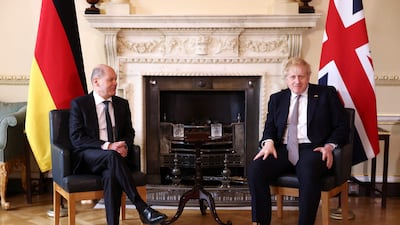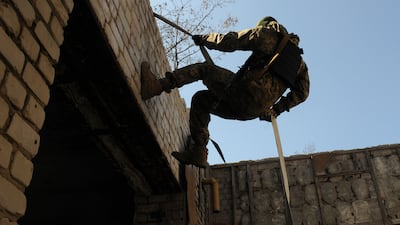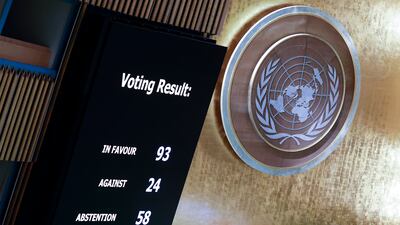Britain announced a new package of military aid for Ukraine on Friday but said it was up to the country’s former Warsaw Pact neighbours to provide the hardware that would most help it fend off Russia’s invasion.
Prime Minister Boris Johnson said the £100 million ($130m) package would include “high-grade military equipment”, including Starstreak anti-aircraft missiles, 800 anti-tank missiles and precision munitions.
He made the announcement, which also included a promise of more helmets and body armour, after holding talks with German Chancellor Olaf Scholz, who was making his first visit to London since taking office in December.
It came after Ukraine pleaded with Nato countries this week for “weapons, weapons, weapons” to repel the Russian offensive and prevent further atrocities, following the massacre discovered in Bucha, near Kyiv.
Ukraine has requested tanks and warplanes, but Mr Johnson played down the possibility of Britain widening its supply of weapons by saying some of Nato’s equipment “simply wouldn’t be appropriate” for Ukrainian forces.
Instead, countries in the former Soviet sphere of influence might have more suitable equipment that could be shipped to Ukraine and replaced by hardware from Britain and other countries, he said.
“It may be more useful to support the Ukrainians by backfilling and allowing some of the former Warsaw Pact countries to supply some of their own armour,” he said. “That may be something we’ll want to consider doing more of.”
Slovakia has proposed such a scheme, offering Soviet-era S-300 air defences to Ukraine if it could receive American-made Patriot defence systems in exchange.
Ukrainian President Volodymyr Zelenskyy has named the S-300 as one of the systems his country needs to fight off an invasion which is now in its seventh week. A Slovakian government office said today it had sent such a system this week.
Also this week, the Czech Republic sent T-72 tanks and BVP-1 infantry fighting vehicles to Ukraine.
Australia is supplying 20 of its domestically produced Bushmaster armoured combat vehicles, following a direct request from Mr Zelenskyy during an address to the Australian Parliament.
The EU has also offered one billion euros ($1.09) to Ukraine to go shopping for its own weapons from manufacturers.
But, as the EU’s own diplomatic chief Josep Borrell said this week, that figure is a fraction of the amount of money paid into Russian coffers for fossil fuel imports to Europe.
Mr Johnson said he and Mr Scholz had agreed to collaborate on ending that reliance, amid pressure on Germany over its opposition to an immediate embargo which it says would cause unacceptable economic damage at home.
“We want to work together with Germany to achieve that,” said Mr Johnson, who said the proposed energy collaboration would include maximising oil and gas extraction from the North Sea.
Mr Scholz said Germany was “doing all we can” to free itself from Russian energy, with plans under way to be end reliance on coal and oil this year but not stop importing gas until 2024.
The EU this week agreed an embargo on coal, in its first venture into energy sanctions after the massacre in Bucha raised pressure on western countries to toughen sanctions on Russia.
An oil embargo will be discussed at talks between EU foreign ministers on Monday.
Ukraine wants to complete the set by blocking gas imports from Russia, on which Europe is particularly reliant.














































